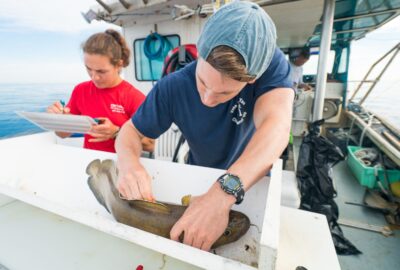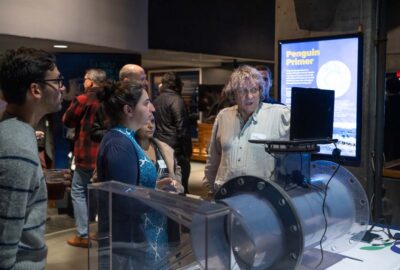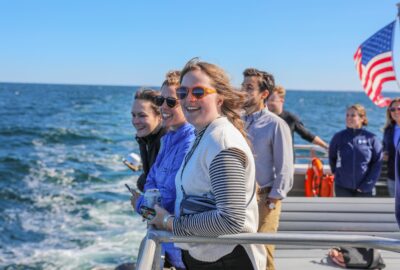Please Note: Our Box Office is currently closed for renovation. We recommend purchasing tickets online in advance to expedite your entry into the Aquarium. Tickets can also be purchased at the Information Desk in our main lobby today.
Bringing the Fight Against Climate Change to Beacon Hill
For the first time in our history, the Aquarium worked alongside state lawmakers to sponsor a slate of climate-related legislation.
By New England Aquarium on Thursday, August 10, 2023

From our home along Boston Harbor, the Aquarium has a front-row seat to the effects of climate change. That unique perspective—and our decades of conservation experience—influenced our first-ever legislative effort, in which the Aquarium sponsored a slate of climate-related bills in support of growing a responsible “blue economy.”
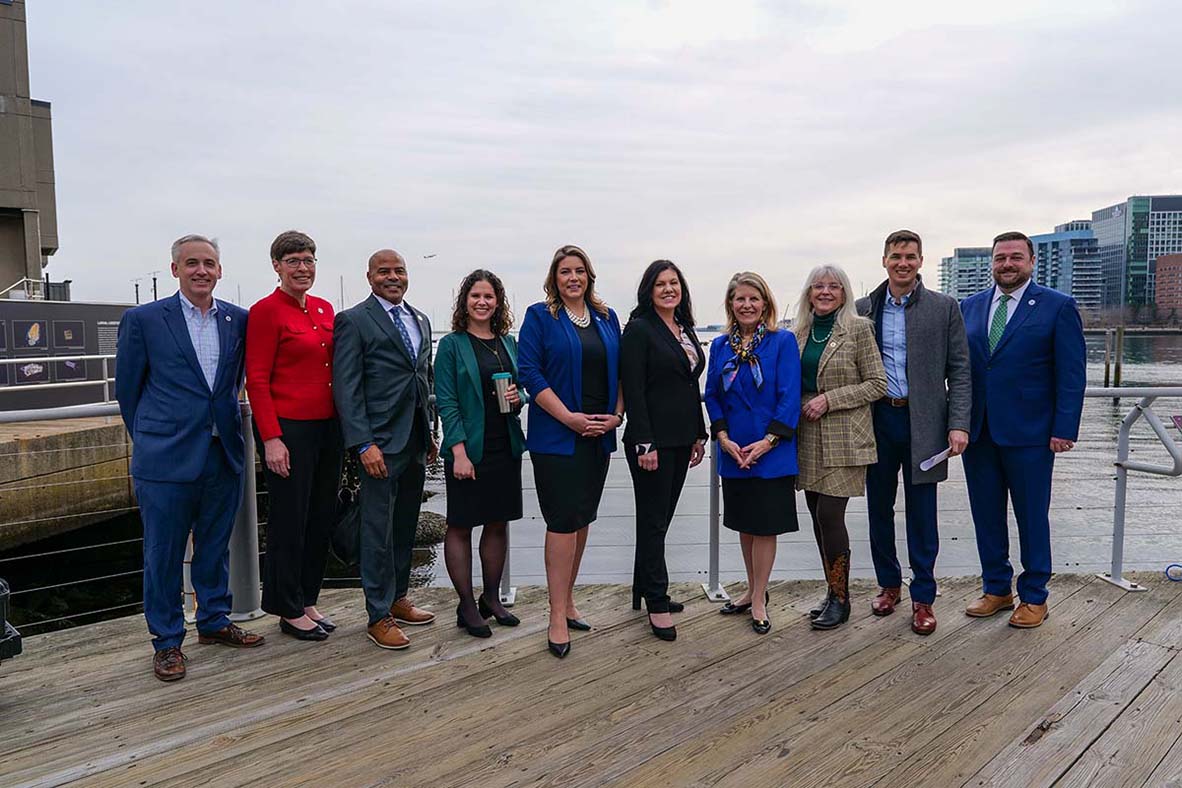
Massachusetts’ blue economy—the industries that rely on our ocean and coastal regions, such as fishing, tourism, and renewable energy—grew 38 percent between 2009 and 2019, and generates $8.2 billion in GDP annually across the industry. The sector is only expected to continue growing with the development of offshore wind, innovations in aquaculture, and coastal resiliency projects. As these initiatives increase ocean use, thoughtful expansion of the blue economy will be critical to preserving marine species and habitats.
“Conservation and economic development are not mutually exclusive,” said James Sutherland, the Aquarium’s associate vice president of public policy and advocacy. “We have a stake in this work as a leading conservation organization in Boston, so we are stepping up to initiate and advocate for legislation to address the myriad environmental and climate change issues facing our ocean and our blue economy.”
The Aquarium worked alongside Senator Susan Moran, Representative Jessica Giannino, and Representative Kathy LaNatra to file legislation focused on wide-ranging issues impacting the blue economy sector, such as ocean conservation science, equitable blue workforce development, the circular economy transition, and “blue carbon” sequestration.
Senator Julian Cyr, Representative Dylan Fernandes, Representative Josh Cutler, and Representative Patrick Kearney also reintroduced climate-related bills, which the Aquarium endorsed. The bills would help mitigate the impacts of ocean acidification on marine ecosystems and the blue economy as well as support fisheries in transitioning to using on-demand fishing gear that helps protect marine life, including critically endangered North Atlantic right whales.
The legislation was officially announced in a press conference held on Central Wharf on an unseasonably warm February day—but this work was several years in the making. When Aquarium President and CEO Vikki N. Spruill joined the organization in 2019, she shared her vision for the Aquarium as a leader in the fight against climate change, and a strong advocate for conservation measures both locally and nationally.
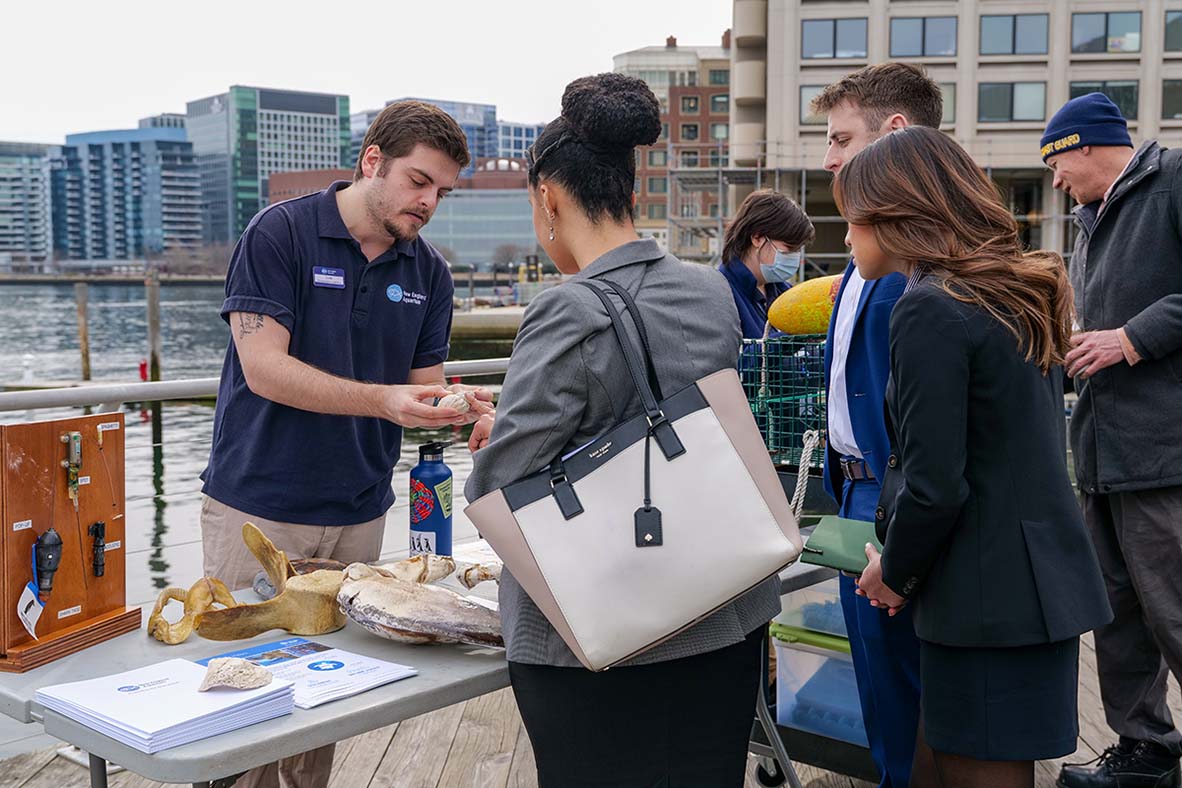
“We come to this work very naturally,” said Spruill in a statement. “Our scientists are in the field seeing the impacts of climate change, the rapidly warming Gulf of Maine, and human impacts to critically endangered whales and other marine animals.”
The press conference was a success, attracting a flurry of coverage from local news outlets, including a story in the Boston Globe. The event also saw waterfront community partners and additional policymakers, including legislators and members of Governor Maura Healey’s staff, convening on the issues.
Senator Moran, one of the sponsors of the legislation, was among the speakers at the event. “Our ability to understand and address climate challenges, promote the creation of thousands of blue economy jobs, and facilitate international competitiveness all rely on understanding and harnessing the power of the ocean,” she said. “Not only will these bills contribute to the climate resiliency of our coastal communities, but they will facilitate the next wave of sustainable economic growth for future generations.”
Alison Rogers Cove, the founder and CEO of USEFULL, also spoke at the press conference, highlighting the importance of collaboration between policy, advocacy, and industry to transition to a circular economy and grow the blue workforce. USEFULL is a start-up working to reduce single-use plastics by enabling corporations, colleges, and more to adopt plastic-free reusable takeout containers (more on page 7).
Cove was selected to participate in BlueSwell, the Aquarium and SeaAhead’s incubator-accelerator for startups in bluetech, which helped enable her to convert her big idea into the successful company USEFULL is today. Other state-sponsored grants allowed Cove to test her products in real-world environments, including on Block Island, RI.
“USEFULL would not be here today without the support we received in our earliest stages,” Cove said. “It’s critical that the state invests in and supports businesses like this.”
While the focus of the blue economy bills is on Massachusetts’ waterways and coastline, the entire state stands to benefit. First, the legislation will help the state reach ambitious emissions reduction goals—an important milestone in preventing further climate change and leading to less pollution in the air and water. A bill filed by Senator Moran in conjunction with Representative Giannino enhances the role that our waterways, seagrass, and salt marshes can play in capturing and storing carbon from the atmosphere by requiring the state to set a net-positive carbon sequestration goal.
A strong blue economy will also support the economic health of the state and provide more job opportunities for residents. Fisheries, coastal infrastructure, and marine industries will be supported by the bills, while new grants will “fund an even more ambitious future for Massachusetts” in the blue economy, Senator Moran said. The proposed grants will expand educational and career development resources, specifically in historically underserved communities. That can help more people across the state gain the skills needed to succeed in blue-STEAM fields while growing and diversifying the blue workforce across Massachusetts.
Helping people and the ocean thrive together is critical for a healthy planet, and this work is becoming ever more important as we face the challenges of a changing climate. While filing this legislation is a major step for the Aquarium, it’s just the beginning of our work with policymakers to ensure a vital and vibrant ocean for generations.
During this past legislative session, the Aquarium teamed with Representative Ann-Margaret Ferrante and Senator Brendan Crighton to file An Act to Facilitate Greater Climate Resiliency, addressing the need for climate-resilient infrastructure across Massachusetts’ coastal communities. Plus, the Aquarium collaborated with Senator Edward Markey and Representative Bill Keating to get bipartisan support for the Sea Turtle Rescue Assistance Act, a bill to support funding for conservation efforts of endangered sea turtles. Both are examples of how the Aquarium has and will continue to use our expertise to advance policies that protect the ocean and strengthen our communities.
At the press conference in February, Spruill touched upon this goal. “The increased use of our ocean has brought countless economic benefits to the state and its residents, and it will continue to do so,” she said to the crowd on Central Wharf. “It must be done responsibly to ensure that ecosystems and marine species are not harmed and that all Massachusetts residents can benefit from the growth of the blue economy. Responsible use of the ocean requires a focus on science, a focus on conservation, and a focus on equity.”
This story originally appeared in the Spring 2023 issue of blue member magazine.

